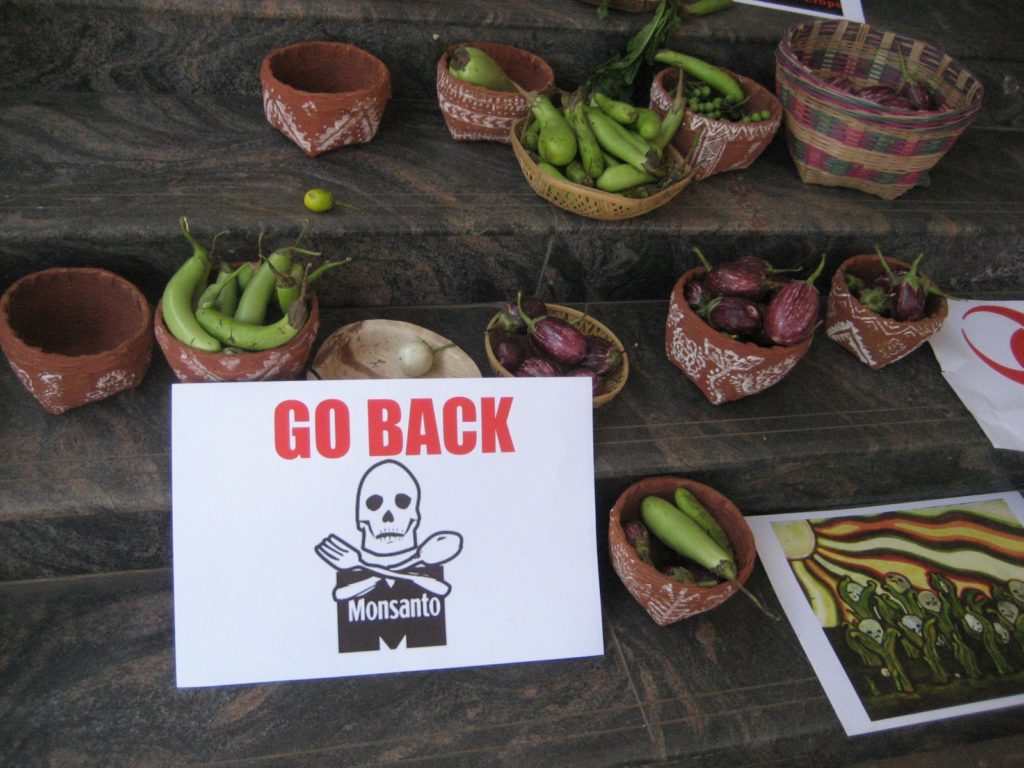After a series of 7 public hearings on Bt Brinjal, on February 9 2010, the then minister of state for Environment of the Govt of India announced an indefinite moratorium on introducing Bt brinjal—the first genetically modified food crop that would have been introduced for mass production in India.
In June 2019, Monsanto lobbyists announced that farmers will illegally plant Bt Brinjal as a “Satyagraha”. This is outright criminal action. As Kishore Tiwari, Chair of the Maharashtra Govt commission on agrarian distress has clearly stated, farmers acting on behest of Monsanto are criminals and will be treated as such.
Article 15 of the Biosafety laws requires govt to act when the rules are violated. Further, the Environment Protection Act 1986 requires that anyone violating the law faces an imprisonment of 5 years.
The reason we have national and international Biosafety laws is because GMOs cause harm to Biodiversity. Bt crops like Bt Cotton and Bt Brinjal have a gene for producing a toxin inserted in the genome of the plant, thus producing the toxin in every cell all the time. It was known in the 1990s and has been scientifically confirmed now that Bt in plants is different from the naturally occurring Bt in the soil.
New studies are showing that Monsanto took a safe natural pest control agent, Bt, and made it a “Supertoxin” by genetically engineering it into plants. The scientific fraud begins with the claim that Bt toxin in crops affects only the bollworm species and controls it.
This is doubly false. While natural Bt affects only the caterpillar family, the “high dose toxin” or “super toxin” in GMO Bt crops affects a wide range of species. Other species are also affected. Further, the bollworm has evolved resistance to Bt as the Indian experience with Bt shows.
Jonathan R. Latham, in an article “Have Monsanto and the biotech industry turned natural Bt pesticides into GMO ‘Super toxins’?” points out:
According to biotech industry lore, the Bt pesticides introduced into many GMO food crops are natural proteins whose toxic activity extends only to narrow groups of insect species. Therefore, these pesticides can all be safely eaten, e.g. by humans.
This is not the interpretation we arrived at after our analysis of the documents accompanying the commercial approval of 23 typical Bt-containing GMO crops, however.
In our publication, authored along with Madeleine Love and Angelika Hilbeck, of the Swiss Federal Institute of Technology (ETH), we show that commercial GMO Bt toxins differ greatly from their natural precursors. These differences are important. They typically cause GMO Bt proteins to be more toxic. Worse, they also cause them to be active against many more species than natural forms of Bt toxins.
Our research has shown that Bt Cotton is affecting soil organisms and destroying the soil food web. Since Bt is a toxin which the plant produces in every cell it is affecting biodiversity, soil health and pollinators.
A study published in a peer reviewed journal (Jagadish C. Tarafdar, Indira Rathore and Vandana Shiva, “Effect of bt-transgenic cotton on soil biological health”, Applied Biological Research, 2012) shows that in the Bt Cotton growing areas of Vidarbha, beneficial soil organisms have declined, undermining soil health and soil fertility. The result revealed a significant decline in actinobacteria (17%), bacterial count (14%) as well as acid phosphatases (27%), phytase (18%), nitrogenase (23%) and dehydrogenase (12%) activities in Bt cotton fields as compared with non-Bt cotton fields.
The study was repeated in 2015, and the soil microorganisms had further declined due to Bt toxin. The decline ranges between 6 and 77% of different parameters, which indicate the severe adverse effect of Bt Cotton on soil biological health. A decrease in bacterial population between 51–77% was noticed under Bt Cotton growing areas as compared to non-Bt cotton soils of different districts.
Several studies also show that Bt cotton has failed to control the bollworm and has instead led to an increase in resistant pests (see, for instance: P.C. Kesavan and M.S. Swaminathan, “Modern technologies for sustainable food and nutrition security”, Current Science, 25 November 2018)
Herbicide resistant Roundup up Ready Crops have increased the use of herbicides like Roundup which has been established to be a carcinogen. Roundup also kills biodiversity of plants and pollinators dependent on them. It has also led to emergence of superweeds. Roundup Ready Bt Cotton is being illegally spread in India with no action from the government against the perpetrators of this crime.
Bt Brinjal will spread the failure and tragedy we have already witnessed in Bt Cotton. Worse, since Bt Brinjal is a food crop, there will be harm to public health. No independent research to prove the safety of Bt Brinjal exists. There are no long-term studies of more than 90 days or human feeding studies.
Bt Brinjal also contains antibiotic resistant genes and poses serious public health concerns with the possibility of ‘horizontal gene transfer’ of antibiotic resistance. Antibiotic resistance is already a major public health problem.
There are tried, tested, and successful alternatives for controlling pests that do not harm public health or environment.
India is the Centre of Origin/Diversity of Brinjal with more than 4500 varieties. The government cannot allow a gang of criminals sponsored by criminal corporations to violate India’s Biodiversity Act to contaminate and pollute this rich diversity.
The higher common good and larger public good is what our Biosafety and Environmental laws are supposed to protect.
Deliberately acting against laws that protect the common good for the greed of a Poison Cartel of three global gene giants which already control 60% of the world’s seed supply through such illegal actions, is participation in their crimes against nature and humanity .
Satyagraha is based on higher consciousness, to promote ahimsa and stop brute law based on violence.
Thoreau engaged in civil disobedience against the poll tax which supported slavery. Gandhi undertook Satyagraha against apartheid in South Africa, against the forced cultivation of indigo in Champaran in 1917, and against the imposition of the Salt Laws in 1930. Following in Gandhi’s footsteps we have undertaken Seed Satyagraha since 1987 to prevent the Poison Cartel from controlling our seeds, our agriculture, our food. India has Art 3j in our patent law which prohibits patents on plants, animals and seeds, since they are not human inventions.
During Gandhi’s 150 anniversary, we will not allow criminal actions undertaken by greedy corporate interests wherein they are seeking to equate the imposition of Seed Slavery with Gandhi’s Satyagraha. Monsanto is not Gandhi. Crimes against nature and society are not Satyagraha. We will uphold the integrity of Satyagraha—the force of truth—and not allow the idea and moral force of Satyagraha to be degraded and misused by those engaging in crimes against nature and people.
We count on the Government of India to strictly implement the Bt Brinjal ban, to uphold India’s Biosafety and Environmental law, and Gandhi’s legacy.
(Vandana Shiva is an Indian scholar, environmental activist, food sovereignty advocate, and alter-globalisation author, based in Delhi.)




